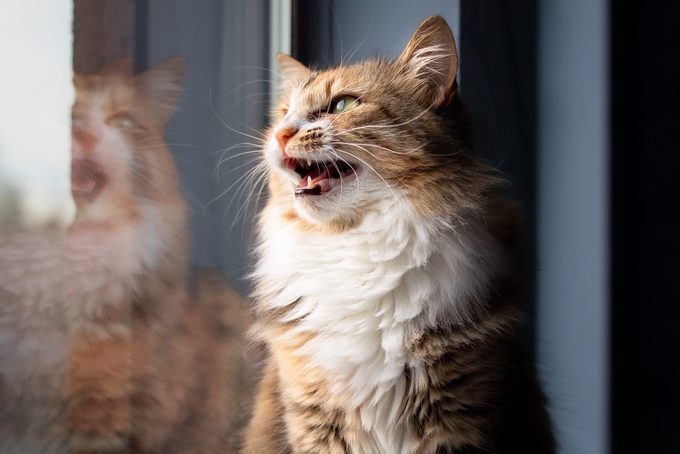Cats have a whole range of vocal tricks, but perhaps most perplexing is the fact that cats chirp (really!). Here’s what this odd, birdlike sound really means.

Why Do Cats Chirp, and Does It Mean They’re Happy?

If you’ve ever seen your cat perched by a window, chirping at birds or bugs, you’ve probably had the same thought as we have: Why do cats chirp? This high-pitched, birdlike sound can be surprising, especially the first time you hear it.
We tend to expect certain vocalizations from our feline friends—meowing, hissing and purring, for instance—but chirping? Most people associate that with friends of the feathered variety. Still, as any cat owner can tell you, cats do chirp. And like the other sounds, it serves a purpose.
To find out more about this adorable cat behavior, we turned to veterinarian Emily Wilson, DVM, founder of Birch Lane Therapeutics animal clinic. In this guide, she’ll help us explain what chirping means, how cats do it and when it might signal something more than just excitement.
Get Reader’s Digest’s Read Up newsletter for more pets, humor, travel, tech and fun facts all week long.
Why do cats chirp at birds and bugs?
One primary reason cats chirp is to express excitement or anticipation when they spot potential prey. It’s often triggered when a cat sees something that excites its hunting instincts, like a bird, toy or bug.
According to Dr. Wilson, a chirp is typically a high-pitched, peep-like or trilled sound. Imagine your cat’s body tensing, eyes locked on a fluttering bird, as a series of quick, breathless chirps escape its mouth—a sure sign that its inner hunter is fully activated. You might also notice other signs of hunting: a rapidly flicking tail, dilated pupils or even teeth chattering in excitement.
What does it mean when cats chirp at you?
Interestingly, a cat’s chirping isn’t always tied to hunting, Dr. Wilson says. Some cats chirp when greeting other cats or humans to show happiness or excitement. “This type of chirp is associated with general excitement or happy hello vocalization,” she explains.
If your cat chirps at you, try petting them or engaging with their favorite toy to strengthen your bond. To further engage a chirping cat, Dr. Wilson recommends using toys that mimic hunting. “This can include cat toys with feathers, toys that produce birdlike noises, laser pointers or even ‘bird TV’ [YouTube videos of birds].”
How do cats chirp, exactly?
According to International Cat Care, cats have three categories of vocalizations: murmurs, meows and aggressive sounds. Chirping, like purring, falls into the murmuring category because it’s done mostly with the mouth closed, explains Dr. Wilson. Picture your cat letting out a series of short, high-pitched sounds, as if speaking with barely parted lips—that’s the essence of a chirp.
Interestingly, big cats like tigers make a similar sound called “chuffing.” Dr. Wilson says chuffing is produced by “blowing air through the nostrils with a closed mouth.” In big cats, chuffing is often used as a greeting or a sign of contentment. Similarly, when domestic cats chirp, they push air over their vocal cords with their mouth mostly closed.
Are cats happy when they chirp?
Cats are typically happy when they chirp, either because they’re anticipating a hunt or greeting someone familiar. When cats are fixated on a bird or bug, they may crouch low to the ground in a classic stalking pose.
“Cats that are greeting a housemate or family member will often show their happiness by headbutting, or asking for attention,” says Dr. Wilson. And they do all this while making that charming chirping noise. For example, your cat might start chirping and rubbing against your legs as soon as you reach for their favorite feather wand.
Whether it’s a high-pitched burst of excitement at the window or a happy little trill just for you, cat chirping is a fascinating part of feline communication. As long as the behavior feels playful or social, there’s usually no cause for concern—it’s just your cat’s way of expressing curiosity, joy or connection.
FAQs
Could chirping indicate a problem?
Chirping is usually normal, but sudden changes may signal an issue. If your cat starts chirping excessively, loudly or in distress, and especially if it’s paired with pacing, hiding or changes in appetite, it could point to anxiety or a medical concern. In that case, consult a vet or feline behaviorist.
Do all cats chirp?
Not all cats chirp; it depends on their personality and communication style. Some cats may be more vocal or expressive than others, using meows, trills or chirps to communicate. If your pet doesn’t make this cat sound, it’s still completely normal.
About the expert
|
Why trust us
At Reader’s Digest, we’re committed to producing high-quality content by writers with expertise and experience in their field in consultation with relevant, qualified experts. We rely on reputable primary sources, including government and professional organizations and academic institutions as well as our writers’ personal experiences where appropriate. We verify all facts and data, back them with credible sourcing and revisit them over time to ensure they remain accurate and up to date. Read more about our team, our contributors and our editorial policies.
Sources:
- Emily Wilson, DVM, IVCA, CVA, veterinarian and founder of Birch Lane Therapeutics animal clinic
- International Cat Care: “Cat Communication”
- The Dodo: “Why do cats chirp?”























